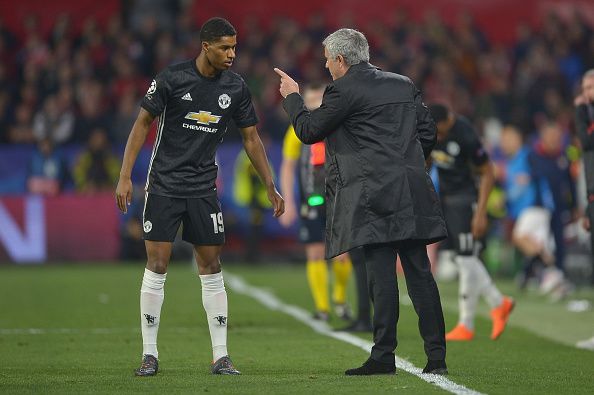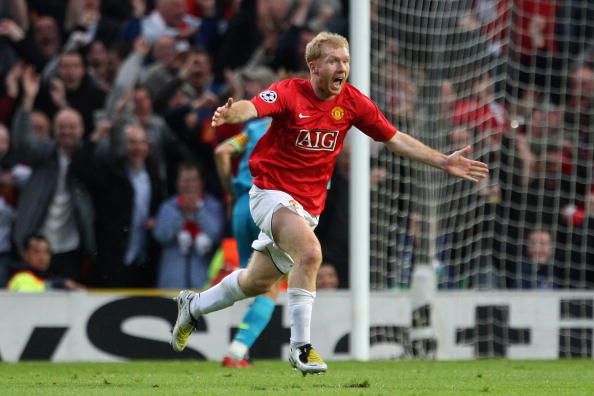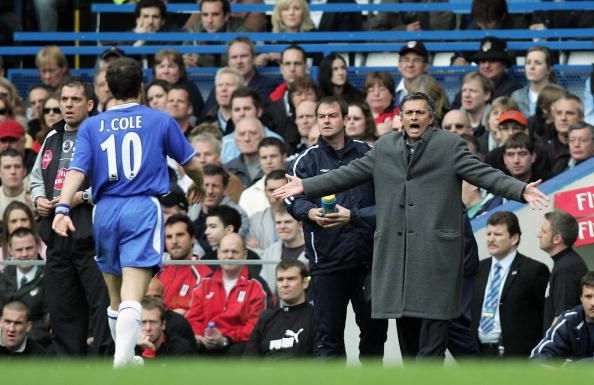

Share
22nd February 2018
07:43pm GMT

 Mourinho shouldn't be bound by tradition. He's there to do a job, and he's going to do it in a manner that has brought him success in the past. United fans knew what they were getting when he was appointed, this can't be a surprise.
Mourinho will never play open, expansive, attacking football, and there's nothing to suggest he can coach a side to play in this manner. The draw with Sevilla was just the latest example of a team without a clear attacking plan. United were waiting for the opponent to make a mistake while the defence and midfield remained rigidly stationed behind isolated forwards, everything in the final third was improvised, off the cuff, and disjointed.
But football is a low-scoring sport, so if the 2013-version of Robin van Persie, rather than Romelu Lukaku, had been playing, then maybe United would have escaped with a win, and Mourinho would have felt validated.
https://twitter.com/RobRedmond10/status/966417705296388096
How United played in the past is of no concern to him, and it's probably unfair to criticise him for failing to adhere to ill-defined principles of attacking football. United didn't always play free-flowing football either. Ferguson regularly used players such as Roy Keane, Nicky Butt and Paul Ince to nullify the threat of Steve McManaman when United played Liverpool. Keane put in one of his best performances ever in the 1996 FA Cup final, a game remembered as one of the worst cup finals ever. Eric Cantona scored the only goal, and Keane assured Liverpool's talented team never got going.
When they advanced past Barcelona in the Champions League semi-finals in 2008, United had 27 percent possession at the Nou Camp in the goalless first-leg, and 37 percent possession in the return tie when they won 1-0 thanks to Paul Scholes' goal. Ferguson's team failed to have a shot on target when they played Manchester City in April 2012, losing 1-0 in a game that effectively decided the title.
Mourinho shouldn't be bound by tradition. He's there to do a job, and he's going to do it in a manner that has brought him success in the past. United fans knew what they were getting when he was appointed, this can't be a surprise.
Mourinho will never play open, expansive, attacking football, and there's nothing to suggest he can coach a side to play in this manner. The draw with Sevilla was just the latest example of a team without a clear attacking plan. United were waiting for the opponent to make a mistake while the defence and midfield remained rigidly stationed behind isolated forwards, everything in the final third was improvised, off the cuff, and disjointed.
But football is a low-scoring sport, so if the 2013-version of Robin van Persie, rather than Romelu Lukaku, had been playing, then maybe United would have escaped with a win, and Mourinho would have felt validated.
https://twitter.com/RobRedmond10/status/966417705296388096
How United played in the past is of no concern to him, and it's probably unfair to criticise him for failing to adhere to ill-defined principles of attacking football. United didn't always play free-flowing football either. Ferguson regularly used players such as Roy Keane, Nicky Butt and Paul Ince to nullify the threat of Steve McManaman when United played Liverpool. Keane put in one of his best performances ever in the 1996 FA Cup final, a game remembered as one of the worst cup finals ever. Eric Cantona scored the only goal, and Keane assured Liverpool's talented team never got going.
When they advanced past Barcelona in the Champions League semi-finals in 2008, United had 27 percent possession at the Nou Camp in the goalless first-leg, and 37 percent possession in the return tie when they won 1-0 thanks to Paul Scholes' goal. Ferguson's team failed to have a shot on target when they played Manchester City in April 2012, losing 1-0 in a game that effectively decided the title.
 Ferguson was as capable of playing conservatively if the occasion called for it. But the former United manager was pragmatic, he approached a game on its merits and tailored a plan to suit it. Mourinho takes an identical approach in every big match, regardless of the talent or form of the opponent. It's on this basis that the current United manager can be criticised. Not his failure to respect the club's tradition of attacking football, but rather how unsuited his tactics are for success going forward.
If Mourinho isn't a success at United – if he doesn't win the Premier League or the Champions League – then it'll be because his methods have been bypassed, not because he didn't adhere to the club's tradition. It could even be argued that Mourinho was somewhat bypassed by Ferguson over a decade ago. He had great success in his first two seasons with Chelsea, playing brilliantly effective counter-attacking football and taking the Premier League by storm, winning two league titles. With Roman Abramovich's billions behind him, it looked as though nothing could stop Mourinho from dominating English football.
Ferguson was as capable of playing conservatively if the occasion called for it. But the former United manager was pragmatic, he approached a game on its merits and tailored a plan to suit it. Mourinho takes an identical approach in every big match, regardless of the talent or form of the opponent. It's on this basis that the current United manager can be criticised. Not his failure to respect the club's tradition of attacking football, but rather how unsuited his tactics are for success going forward.
If Mourinho isn't a success at United – if he doesn't win the Premier League or the Champions League – then it'll be because his methods have been bypassed, not because he didn't adhere to the club's tradition. It could even be argued that Mourinho was somewhat bypassed by Ferguson over a decade ago. He had great success in his first two seasons with Chelsea, playing brilliantly effective counter-attacking football and taking the Premier League by storm, winning two league titles. With Roman Abramovich's billions behind him, it looked as though nothing could stop Mourinho from dominating English football.
 Yet, Ferguson adapted. He built a defence which was just as strong as Chelsea's - United went 14 consecutive games of the 2008/09 season without conceding a goal - and mirrored Mourinho's approach by starting the 2006/07 season strongly, rather than aiming to peak after Christmas. Ferguson bypassed his rival. He ditched United's lone striker system by selling Ruud van Nistelrooy and deployed a fantastic, fluid front-three of Cristiano Ronaldo, Carlos Tevez and Wayne Rooney. United played without a recognised centre forward, but with a level of attacking flair and versatility beyond anything we've ever seen from a rigid Mourinho side.
Football has moved on from Mourinho's high-points in 2004 and 2010, but it doesn't seem like he has adapted his tactics. That should be the main concern for United fans, and the primary criticism of Mourinho - not that his side doesn't play as United teams are supposed to. That was never going to happen, never will, and no-one should expect it.
Yet, Ferguson adapted. He built a defence which was just as strong as Chelsea's - United went 14 consecutive games of the 2008/09 season without conceding a goal - and mirrored Mourinho's approach by starting the 2006/07 season strongly, rather than aiming to peak after Christmas. Ferguson bypassed his rival. He ditched United's lone striker system by selling Ruud van Nistelrooy and deployed a fantastic, fluid front-three of Cristiano Ronaldo, Carlos Tevez and Wayne Rooney. United played without a recognised centre forward, but with a level of attacking flair and versatility beyond anything we've ever seen from a rigid Mourinho side.
Football has moved on from Mourinho's high-points in 2004 and 2010, but it doesn't seem like he has adapted his tactics. That should be the main concern for United fans, and the primary criticism of Mourinho - not that his side doesn't play as United teams are supposed to. That was never going to happen, never will, and no-one should expect it.Explore more on these topics: